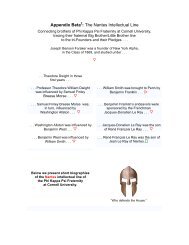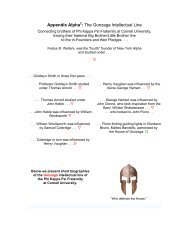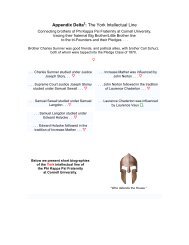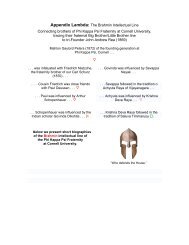Gondar - Phi Kappa Psi
Gondar - Phi Kappa Psi
Gondar - Phi Kappa Psi
You also want an ePaper? Increase the reach of your titles
YUMPU automatically turns print PDFs into web optimized ePapers that Google loves.
The canton had not been left uninfluenced by the Protestant movement.<br />
Canisius worked indefatigably with the provost Peter Schnewly, the Franciscan<br />
Johannes Michel, and others, for the revival of religious sentiments amongst the<br />
people; since then Fribourg has remained a stronghold of the Catholic Church. In<br />
1584, while on the way to take part in another meeting of the order at Augsburg,<br />
he preached at Lucerne and made a pilgrimage to the miraculous image of the<br />
Blessed Virgin at Einsiedeln. According to his own account, it was then that St.<br />
Nicholas, the patron saint of Fribourg, made known to him his desire that<br />
Canisius should not leave Fribourg again. Many times the superiors of the order<br />
planned to transfer him to another house, but the nuncio, the city council, and the<br />
citizens themselves opposed the measure; they would not consent to lose this<br />
celebrated and saintly man. The last years of his life he devoted to the instruction<br />
of converts, to making spiritual addresses to the brothers of the order, to writing<br />
and re-editing books. The city authorities ordered his body to be buried before<br />
the high altar of the principal church, the Church of St. Nicolaus, from which they<br />
were translated in 1625 to that of St. Michael, the church of the Jesuit College.<br />
Canisius held that to defend the Catholic truths with the pen was just as<br />
important as to convert the Hindus. At Rome and Trent he strongly urged the<br />
appointment at the council, at the papal court, and in other parts of Italy, of able<br />
theologians to write in defence of the Catholic faith. He begged Pius V to send<br />
yearly subsidies to the Catholic printers of Germany, and to permit German<br />
scholars to edit Roman manuscripts; he induced the city council of Fribourg to<br />
erect a printing establishment, and he secured special privileges for printers. He<br />
also kept in touch with the chief Catholic printers of his time &151; Plantin of<br />
Antwerp, Cholin of Cologne, and Mayer of Dillingen &151; and had foreign works<br />
of importance reprinted in Germany, for example, the works of Andrada,<br />
Fontidonio, and Villalpando in defence of the Council of Trent.<br />
Canisius advised the generals of the order to create a college of authors;<br />
urged scholars like Bartholomæus Latomus, Friedrich Staphylus, and<br />
Hieronymus Torensis to publish their works; assisted Onofrio Panvinio and the<br />
polemic Stanislaus Hosius, reading their manuscripts and correcting proofs; and<br />
contributed to the work of his friend Surius on the councils. At his solicitation the<br />
"Briefe aus Indien", the first relations of Catholic missioners, were published<br />
(Dillingen, 1563-71); "Canisius", wrote the Protestant preacher, Witz, "by this<br />
activity gave an impulse which deserves our undivided recognition, indeed which<br />
arouses our admiration" ("Petrus Canisius", Vienna, 1897, p. 12).<br />
With apostolic zeal he loved the Society of Jesus; the day of his admission<br />
to the order he called his second birthday. Obedience to his superiors was his<br />
first rule. As a superior he cared with parental love for the necessities of his<br />
subordinates. Shortly before his death he declared that he had never regretted<br />
becoming a Jesuit, and recalled the abuses which the opponents of the Church<br />
had heaped upon his order and his person. Johann Wigand wrote a vile<br />
pamphlet against his "Catechism"; Flacius Illyricus, Johann Gnypheus, and Paul






